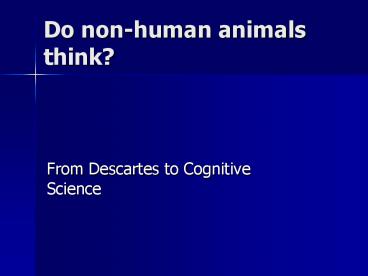Do nonhuman animals think PowerPoint PPT Presentation
1 / 21
Title: Do nonhuman animals think
1
Do non-human animals think?
- From Descartes to Cognitive Science
2
Dualism and animals
- Does dualism entail that other animals do not
have minds? - Descartes is a dualist.
- Descartes believes that other animals dont
think. - But a dualist could disagree.
- Why?
3
Consciousness vs. Thought
- What exactly does Descartes deny to animals?
- Does Descartes deny animal consciousness?
- Distinguish different aspects of mind
- Consciousness
- Thought
- Theory of mind
- Self-consciousness
4
Consciousness
- Simple awareness
- Feeling pain
- Seeing color
- Hearing sounds
- Fear
- Pleasure
5
Thought
- Examples
- Believing that snow is white.
- Wishing that I owned a vintage DAngelico New
Yorker. - Expecting that my friend will return in a
fortnight. - Thought is propositional.
6
Theory of mind
- Examples
- Predicting that your will be jealous (or not) if
I get a DAngelico New Yorker. - Appreciating that if we meet and you say Hi and
I say Hi that it would be inappropriate for you
to say Hi again. - Requires special concepts, the ability to think
about other minds.
7
Self-consciousness
- Awareness of my thoughts as mine.
- Ability to think things without saying them.
- Awareness of the causes of my mental states.
8
Does Descartes deny animal consciousness?
- what changes must take place in the brain to
produce waking, sleep, and dreams how light,
sounds, odors, tastes, heat, and all the other
qualities of external objects impress it with
different ideas by means of the senses how
hunger, thirst, and the other internal affections
can likewise impress upon it divers ideas what
must be understood by the common sense (sensus
communis) in which these ideas are received, by
the memory which retains them, by the fantasy
which can change them in various ways, and out of
them compose new ideas, and which, by the same
means, distributing the animal spirits through
the muscles, can cause the members of such a body
to move in as many different ways, and in a
manner as suited, whether to the objects that are
presented to its senses or to its internal
affections, as can take place in our own case
apart from the guidance of the will.
9
Animals have consciousness
- Animals sense
- Animals have memory
- Animals move suitably in response to stimuli from
their environment. - This is all mechanical. quote
- We could, in principle, build machines that
completely replicate other animals.
10
Do (other) animals think?
- Could we build a machine that completely
replicates a man? - Descartes Two tests show that the answer is
negative - It couldnt use language.
- It couldnt act from knowledge but only from
the disposition of their organs. quote - Therefore, humans have something (thought) that
animals dont have.
11
In support of Descartes claim
- Descartes doesnt deny that animals could appear
to use some language. - But do any animals besides us have the use of
language as a universal tool, fitted to all
circumstances? - Even idiots but not the smartest animal.
12
Objection
- Montaigne Other animals do stuff we cant do.
- Descartes Granted. But that doesnt show that
they think. - Nature acts in them according to the disposition
of their organs.
13
Descartes tests again
- Appear to be empirical tests
- Could we build an automaton that has language?
- Is there language in other animals?
14
Another Route
- Real language competence is a sufficient
condition for thinking, but is it a necessary
condition? - How about problem solving?
- Kohlers monkeys cf. Inside the Animal Mind
- Categorization?
- Alex the parrot categorizes objects
15
All or nothing or a matter of degree?
- Is thinking something you have or dont have, or
could it be a matter of degree? - Maybe language is a manifestation of a more
fundamental cognitive phenomenon.
16
Animals and kids
- When do you get a mind?
- Are you born with it?
- Cognitive Development The field that studies how
children acquire language, a theory of mind, and
self-consciousness. - Use that field to study animal minds.
17
Do primates have a theory of mind?
- Can a primate believe that another primate sees,
believes, knows or wants? - What evidence would support such a claim?
- Heyes reviews some of the experimental evidence.
18
Potential evidence
- Imitation
- Self-recognition
- Social relationships
- Role-taking
- Deception
- Perspective-taking
19
Key Question
- Must we attribute a theory of mind to the primate
to explain these behaviors? - How should we design experiments to distinguish
between a mentalistic and non-mentalistic
explanation?
20
Example Imitation
- Chimps do some imitation see also Inside the
Animal Mind - But not conclusive evidence
- Even if apes ape doesnt follow that they need
a theory of mind to do so.
21
Self-concept
- Chimps marked with a red spot on their heads.
- Then exposed to a mirror.
- Do they use the mirror to inspect their red spot?
- They touch their head at the red spot more when
they are in front of the mirror.

